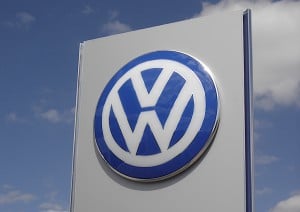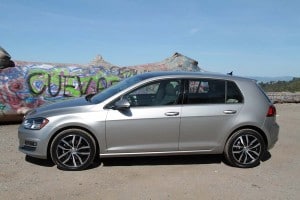
Volkswagen has reached an agreement with the Environmental Protection Agency that will allow it to sell off about 67,000 diesel vehicles that have been in limbo since the EPA accused the German maker of cheating on emissions tests in September 2015.
The EPA previously approved a fix for about 70,000 VW diesel vehicles already in consumer hands. But the carmaker will still have to repurchase roughly 500,000 vehicles using its 2.0- and 3.0-liter diesel engines that cannot be brought into compliance with Clear Air Act standards.

Separately, VW on Thursday said that it had reached an agreement with 10 states about environmental and consumer claims related to the diesel emissions scandal. The deal will cost the maker an estimated $157.45 million, but in a statement, VW said, it “avoids further prolonged and costly litigation,” and will let the carmaker “work to earn back the trust of its customers, regulators and the public.”
The scandal was touched off when the EPA accused VW of illegally rigging its 2.0-liter diesel engine to modify settings while undergoing emissions tests. Under normal conditions, the diesels would produce dozens of times higher levels of pollutants, including smog-causing oxides of nitrogen. The maker subsequently acknowledged it had also rigged a more upscale 3.0-liter engine shared with the Audi and Porsche brands.
(VW bill rises to $25 billion in the U.S. Click Here to see how.)
In July 2016, the automaker reached a $15 billion civil settlement with various federal agencies, as well as the State of California, calling for a buyback of the 2.0-liter diesels that had already been sold. Some of that money also was to be used to offset pollution caused by the rigging, and to promote new zero-emission technologies.

VW has since agreed to several other civil deals and, in January, a criminal settlement with the U.S. Justice Department. All told, it has spent about $30 billion as a result of the scandal. But it has yet to resolve a lawsuit by shareholders, and criminal investigations are still underway in Germany.
The two announcements on Thursday nonetheless help move Volkswagen closer to the point where it can put the diesel scandal in the rearview mirror.
When the EPA first accused VW of using a so-called “defeat device” in the 2.0-liter diesel the agency ordered an immediate halt to sales of those vehicles. The 3.0-liter engine was subsequently added to the stop-sale. Since then, those cars have been in limbo, about 12,000 of them on dealer lots, the rest in VW inventory.
(Click Here to see how the diesel scandal has impacted VW profits.)
The new agreement will allow VW to upgrade the engine and control systems to comply with U.S. emissions standards – as well as the tougher standards in place in California and 11 other states.
The exact timing for dealers to resume taking orders is uncertain, however, VW noting in its statement, “We are still finalizing the details of this program and will provide more information on its implementation at the appropriate time,”
This could mark the last time U.S. consumers will be able to purchase a Volkswagen diesel. Brand boss Herbert Diess has said on several recent occasions that VW will not ship the so-called “oil burners” to the States anymore, but will shift emphasis to battery-based vehicles, such as the Volkswagen I.D. sedan concept it unveiled last year. All told, the brand plans to have 30 battery-electric vehicles in its line-up by 2025.
The Audi brand, however, has indicated it may continue offering at least one diesel model in the U.S., going forward. The final price tag for the scandal is still expected to climb, with a settlement covering Volkswagen shareholders still under negotiation.
(To see more about how important the U.S. market is to Volkswagen, Click Here.)
But the automaker has now wrapped up environmental and consumer claims filed by 10 U.S. states: Connecticut, Delaware, Maine, Massachusetts, New York, Oregon, Pennsylvania, Rhode Island, Vermont and Washington. Some of those states had participated in a previous settlement that paid out $603 million to 44 states, as well as the District of Columbia and Puerto Rico.







